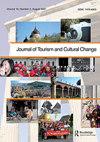Tourist memory and childhood landscape
IF 2.5
4区 管理学
Q2 HOSPITALITY, LEISURE, SPORT & TOURISM
引用次数: 0
Abstract
ABSTRACT Tourist memory serves as an important source of information for future travel plans and forests life development of individuals. Although extensive research has examined the impacts of tourist memory on travel behaviors and tourists’ emotions, very few studies have examined tourist memory from the perspective of childhood landscape. This study adopts the in-depth interview method (n=105) to examine the long-term impacts of childhood tourist memories on adulthood and future development by two different study groups: the new generation and the old generation. Results indicate that tourist memory can enrich individuals’ identity and nostalgia through the childhood landscape. Moreover, the childhood landscape shaped from tourism experiences affects the long-term development processes of tourists’ personalities, parenting, and life attitudes. Study findings conclude that tourist memory and nostalgia can affect an individual’s future decision-making and practice. This study enriches tourist memory and family tourism theories and provides management implications to enhance childhood landscape in tourism marketing.游客记忆和童年景观
摘要旅游记忆是个人未来旅行计划和森林生活发展的重要信息来源。尽管已有大量研究考察了游客记忆对旅游行为和游客情绪的影响,但很少有研究从童年景观的角度考察游客记忆。本研究采用深度访谈法(n=105),通过新一代和老一代两个不同的研究群体,考察童年旅游记忆对成年和未来发展的长期影响。研究结果表明,游客记忆可以通过童年景观丰富个体的身份认同和怀旧情绪。此外,旅游体验塑造的童年景观影响着游客个性、育儿和生活态度的长期发展过程。研究结果表明,游客记忆和怀旧情绪会影响个人未来的决策和实践。本研究丰富了旅游记忆和家庭旅游理论,为旅游营销中提升儿童景观提供了管理启示。
本文章由计算机程序翻译,如有差异,请以英文原文为准。
求助全文
约1分钟内获得全文
求助全文
来源期刊

Journal of Tourism and Cultural Change
HOSPITALITY, LEISURE, SPORT & TOURISM-
CiteScore
5.10
自引率
9.10%
发文量
31
期刊介绍:
Journal of Tourism and Cultural Change ( JTCC ) is a peer-reviewed, transdisciplinary and transnational journal. It focuses on critically examining the relationships, tensions, representations, conflicts and possibilities that exist between tourism/travel and culture/cultures in an increasingly complex global context. JTCC provides a forum for debate against the backdrop of local, regional, national and transnational understandings of identity and difference. Economic restructuring, recognitions of the cultural dimension of biodiversity and sustainable development, contests regarding the positive and negative impact of patterns of tourist behaviour on cultural diversity, and transcultural strivings - all provide an important focus for JTCC . Global capitalism, in its myriad forms engages with multiple ''ways of being'', generating new relationships, re-evaluating existing, and challenging ways of knowing and being. Tourists and the tourism industry continue to find inventive ways to commodify, transform, present/re-present and consume material culture. JTCC seeks to widen and deepen understandings of such changing relationships and stimulate critical debate by: -Adopting a multidisciplinary approach -Encouraging deep and critical approaches to policy and practice -Embracing an inclusive definition of culture -Focusing on the concept, processes and meanings of change -Encouraging trans-national/transcultural perspectives
 求助内容:
求助内容: 应助结果提醒方式:
应助结果提醒方式:


